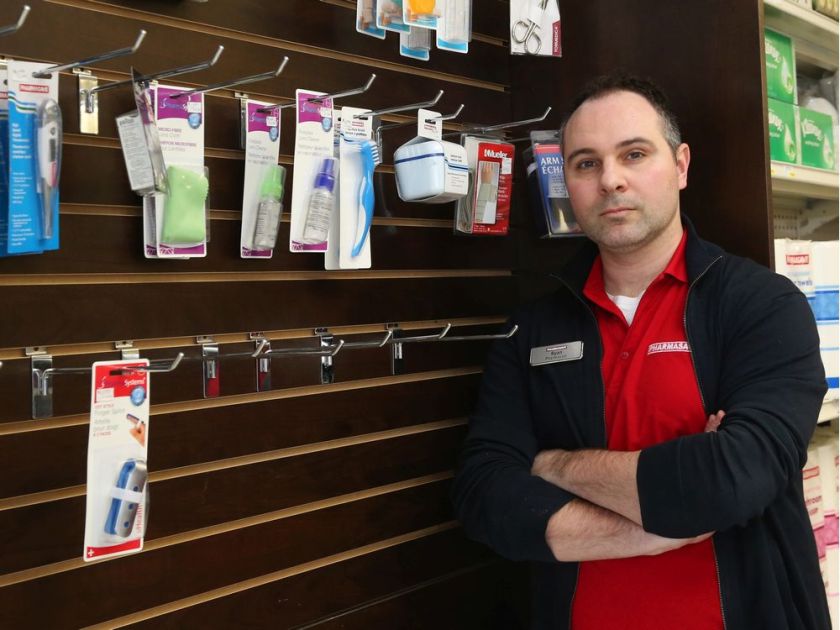Ryan Jarratt, owner-pharmacist of Pharmasave Respect Rx, says his business has run out of surgical masks.
The arrival of coronavirus in Canada is raising anxiety levels in Ottawa.
Over the weekend, health officials in the city heard from and saw numerous people wondering whether they needed to be tested for the new coronavirus that has, so far, killed more than 80 people in China.
“People are concerned. I know. I have heard from people. They are afraid,” said Ottawa’s Chief Medical Officer of Health, Dr. Vera Etches.
“People are asking: Should I be afraid? What should I do? Should I wear a mask?”
The risk to the general population, she said, remains low.
The growing concerns came as public health officials in Toronto announced Canada’s first case of the coronavirus on Saturday. The Toronto man, in his 50s, flew from Wuhan, the epicentre of the outbreak, last Wednesday. On Monday, officials announced that the man’s wife, who had been in isolation, is the country’s second presumptive case, with testing yet to confirm whether she is infected.
As of Monday evening, 25 people have been tested in Canada so far, with an additional 19 cases under investigation in Ontario.
While there have been many concerns expressed in Ottawa, Etches said no one has yet been tested for the illness but that could likely change.
“We are seeing people come forward with respiratory symptoms and then we are going through the process of assessing their travel history to see if it is relevant.”
Anyone with a fever and respiratory symptoms who has travelled to Wuhan in China or has been in contact with someone who was in Wuhan should either phone public health or phone ahead to the hospital, she said, for an assessment about whether they need to be tested.
“That is a small number of people.”
Meanwhile, ambulance dispatchers have begun screening emergency calls to ask about travel to China or contact with an infected person, so that paramedics can be notified before they reach the scene, said Ottawa paramedic chief Peter Kelly.
Canada’s Chief Medical Officer of Health, Dr. Teresa Tam, underlined the message that the general risk to Canadians remains low.
“Canadians should not be concerned they can pick up the virus through casual contact such as walking through the airport,” she said.
“If you are in China, this is a serious situation. If you are in Canada, the current assessment is that the risk remains low.”
Tam noted that the situation is fluid and said it would not be surprising to see more cases is Canada.
While federal, provincial and local public health officials monitor coronavirus warily, local hospitals are dealing with more chronic issues — overcrowding that has worsened during flu and virus season.
At Queensway Carleton Hospital, there have not been many questions about coronavirus, said spokesperson Ann Fuller, but “we are seeing many people come in with normal viral and respiratory illness.”
On Monday, Queensway Carleton was at 111-per-cent capacity with 33 patients waiting to be admitted — 27 on stretchers in emergency. Four surgeries were cancelled Monday and three more were cancelled for Tuesday.
The hospital has 74 patients who require isolation — many with respiratory illness.
The Ottawa Hospital was at more than 103 per cent total capacity.
Some have raised concerns about the ability of overcrowded hospitals to deal with a serious outbreak of coronavirus should cases expand significantly.
What you should know:
Anyone who has travelled to affected areas in China and who has respiratory symptoms should go to a hospital emergency department and pay attention to special signage about coronavirus. Patients should call in advance before visiting a clinic.
Symptom include fever, cough and shortness of breath.
More information and regular updates are available at ottawapublichealth.ca as well as Ontario.ca and .canada.ca/en/public-health/services/diseases/2019-novel-coronavirus-infection.html
Ottawa Public Health recommends residents wash their hands frequently, avoid touching their face, cover coughs and sneezes, stay home if sick and get the flu shot to reduce the spread of germs.
